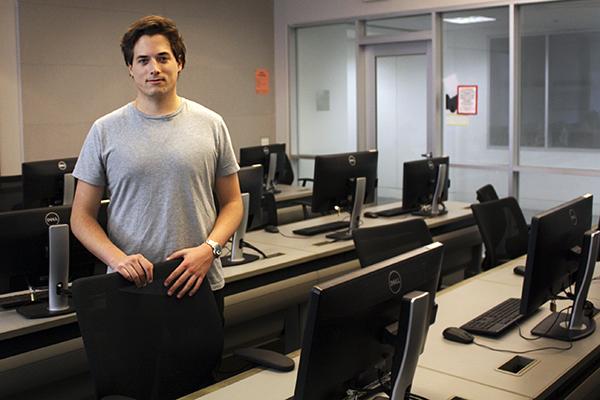A software used to detect cheating on online quizzes remains rarely used by faculty at GW, two years after officials began testing it.
GW entered into a University-wide contract with Software Secure, a software company that produces a system called Remote Proctor Now, a year and a half ago. This technology uses a webcam to record a student taking an exam online, but it has been a slow start getting faculty in online degree programs to take advantage of the technology.
Neil Cohen, an associate professor of finance, was part of the online integrity task force, a committee created in 2014 that was designed to agree on one vendor for the online proctoring program. Cohen did several trials of proctoring programs in his own courses two years ago, but said he doesn’t know of other faculty members who use it now.
Other faculty said they rely on tools like timed quizzes to prevent cheating on tests that don’t take place in their own classrooms.
Cohen said because his courses come later in the online MBA curriculum, he will not implement remote proctoring until professors teaching lower-level courses do because he does not want to spring new technology on students who are unfamiliar with it. He said that some faculty are hoping to add more information about the program to the website soon and begin encouraging faculty to implement it.
“If we had spring 2016 to make the first step to publicize and formalize it, by fall 2017, a year and a half from now, we’ll be on the road,” Cohen said. “We’ll be able to say with some pride and specificity that the grade a student gets is a deserved grade, and not based on plagiarism and copying.”
The company charges a small fee per exam, but the University’s contract with Software Secure means faculty who use the software receive a discount. The fee, which Cohen said is about $15, could eventually be part of the course registration fee if the technology becomes more popular.
Students using the software are required to register online in advance of the exam. During the test, the remote proctor records the student’s keyboard strokes and monitors them through their webcam, locking down their internet access.
“It’s quite hair-raising because it’s an invasion of privacy. There’s no two ways about it,” Cohen said.
Cohen said while some students in the tests were hugely resistant to the technology, one even threatening to “take action,” most were grateful that there would be a way to enforce academic integrity in a situation where students are prone to cheat using the Internet or other resources.
“When students know that others cheat their way through, they know that it reduces the quality and reputation of their own degree,” Cohen said.
Geneva Henry, the vice provost for libraries who oversee online education, said maintaining academic integrity in online courses is challenging because in-person proctoring of exams is not possible. When professors can monitor exams in their on-campus classes, it is more difficult for students to cheat.
“The value of an online degree depends on the university’s ability to ensure that online coursework meets the same standards of rigor as its brick-and-mortar courses,” Henry said in an email. “GW uses a software solution tailored to the needs of online test-takers.”
Henry declined to say how many faculty have made use of this technology.
The technology could also be helpful for students in on-campus classes who may need to travel unexpectedly during an exam.
Andres Saenz, a senior majoring in business administration and finance, had to leave the country for a surgery during the exam period of his on-campus finance class. He said the technology was helpful in his circumstance. He also said that friends of his at other universities have used similar technology, and all have liked it and appreciated the flexibility it gives to students who may need to travel.
“It’s a little weird that I was in my room and there was somebody watching my exam,” Saenz said.







